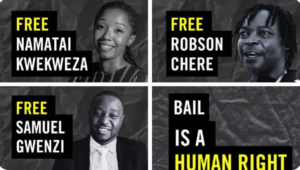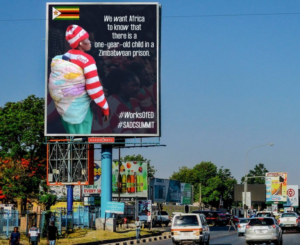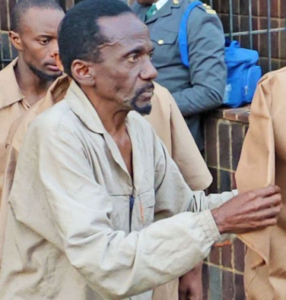ZIMBABWE’S HUMAN RIGHTS NIGHTMARE

The 2023 Country Reports on Human Rights Practices have revealed shocking corruption and severe human rights abuses in Zimbabwe. Despite having anti-corruption courts in all 10 provinces, the report highlights significant problems such as political interference and poor investigations. These issues weaken the judicial efforts meant to fight corruption.
In Zimbabwe, petty corruption is common. Low- to mid-level officials, including police and local authorities, often ask for bribes. More troubling is the grand corruption involving high-ranking political figures. They misuse their power for personal gain. Al Jazeera’s investigative series ‘Gold Mafia’ revealed top officials involved in gold smuggling and money laundering through banks in South Africa and the UAE. People close to President Emmerson Mnangagwa, like Ambassador-at-Large Uebert Angel and Zimbabwe Miners’ Federation president Henrietta Rushwaya, were named in these illegal activities.
The report also criticizes the Zimbabwe Anti-Corruption Commission (ZACC) for its lack of effectiveness. In 2022, ZACC handled 684 complaints, a 38% drop from the previous year. However, because ZACC lacks prosecutorial power, corrupt officials are often released without conviction, creating a cycle of ‘catch and release’.
Zimbabwe’s prisons are also heavily criticized. They are overcrowded and underfunded, posing serious risks to inmates. Reports frequently mention food shortages, lack of clean water, and insufficient medical care. The Harare Remand Prison is particularly overpopulated and violent, with former inmates reporting daily beatings by guards. Children under four, living with their incarcerated mothers, face additional hardships, sharing the limited food with their parents instead of getting their own portions.
The report highlights the government’s failure to address politically motivated violence. For example, the murder of Persuade Mandara by the Zimbabwe Republic Police under suspicious circumstances related to grain theft, and the abduction and killing of CCC activist Tapfumaneyi Masaya, show a pattern of impunity and government wrongdoing.
During election periods, there are reports of voter intimidation by groups linked to the Central Intelligence Organisation. These groups, pretending to conduct exit polls, have coerced voters and undermined the democratic process.
Human rights defenders and non-governmental organizations are constantly harassed and surveilled. They are often labeled as threats to national security or foreign agents. In one notable case, lawyers Doug Coltart and Tapiwa Muchineripi were arrested while helping victims of abduction and torture. This reflects the government’s broader strategy of suppressing dissent and controlling the narrative through fear and repression.
These abuses point to a larger crisis of governance in Zimbabwe. State institutions are used as tools of political power instead of serving the public and ensuring accountability. Both the international community and local activists are calling for significant reforms and real safeguards to protect human rights and restore justice in Zimbabwe. However, the current situation remains bleak. Corruption is deeply rooted, and human rights are constantly violated.
The report paints a grim picture of Zimbabwe, where corruption and human rights abuses are rampant. Despite the efforts of specialized courts and anti-corruption bodies, political interference and ineffective investigations undermine the fight against corruption. Inmates in overcrowded prisons suffer from poor conditions, and politically motivated violence goes unchecked. Voter intimidation and harassment of human rights defenders further highlight the country’s governance crisis. Without substantial reforms, the outlook for human rights and justice in Zimbabwe remains dire.




This report is deeply concerning. The corruption in Zimbabwe is not just limited to lower-level officials but extends to the highest echelons of power. It’s disappointing to see such blatant misuse of authority and resources by those who are supposed to serve the people.The ineffective efforts of the Zimbabwe Anti-Corruption Commission are shocking. Handling fewer complaints and failing to prosecute corrupt officials shows a complete breakdown of justice. This cycle of ‘catch and release’ is an insult to the citizens who suffer daily due to corruption.
The government’s failure to address politically motivated violence and voter intimidation is unacceptable. It’s clear that the ruling powers are more interested in maintaining their control than ensuring free and fair elections. This is a blatant abuse of power.
The conditions in Zimbabwe’s prisons are horrifying. Overcrowding, food shortages, and violent treatment of inmates are human rights violations of the worst kind. It’s heartbreaking to think about children living in these conditions with their incarcerated mothers.
While the report highlights serious issues, it’s encouraging to see international attention being given to Zimbabwe’s corruption and human rights abuses. Hopefully, this will lead to increased pressure on the government to implement meaningful reforms. The exposure of high-level corruption through investigative journalism, like Al Jazeera’s ‘Gold Mafia’ series, is crucial. Shedding light on these activities is the first step towards accountability and change.